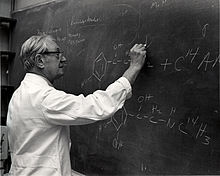Julius Axelrod
Julius Axelrod (born May 30, 1912 in New York City , † December 29, 2004 in Rockville , Maryland ) was an American pharmacologist , neurochemist and recipient of the Nobel Prize in Physiology or Medicine .
Life
Axelrod grew up in poor conditions as the son of Jewish immigrants from Poland on the East Side of New York. He began his scientific career as an unpaid laboratory assistant in 1933 after completing his bachelor's degree in biology at a New York college. The pharmacologist Bernard B. Brodie soon recognized the potential of the young scientist, who was particularly interested in pharmacological and biochemical issues, and brought him to his laboratory. Both helped the drug paracetamol to make its breakthrough.
During his work, he studied on the side and graduated with a Master of Science degree from New York University in 1941 . At the age of 43 he received his PhD from George Washington University in Washington, DC and then headed his own laboratory at the National Institutes of Health in Bethesda , Maryland .
For his work, he and Ulf von Euler and Sir Bernard Katz received the Nobel Prize in Physiology or Medicine in 1970 for their discoveries in connection with the humoral transmitters in nerve endings and the mechanism of their storage, release and inactivation .
This makes him a pioneer in the development of antidepressants .
Axelrod was elected to the National Academy of Sciences (Washington) and the American Academy of Arts and Sciences in 1971 , and was elected to the American Philosophical Society in 1995. The German Pharmacological Society awarded him their highest honor in 1978 with the Schmiedeberg plaque . In 1967 he had already received the Gairdner Foundation International Award . In 1992 he received the Ralph W. Gerard Prize . Since 1984 he was a foreign member of the Academy of Sciences of the GDR .
Works (selection)
- Julius Axelrod et al. (Ed.): Biochemical actions of hormones. Volume 1, Academic Press, New York 1970 ISBN 0-12-452801-5
- Richard J. Wurtman, Julius Axelrod, Douglas E. Kelly: The pineal. Academic Press, New York 1968
- Perspectives in neuropharmacology. A tribute to Julius Axelrod. Ed. by Solomon Halbert Snyder. Oxford University Press, New York 1972
literature
- Gisela Baumgart: Axelrod, Julius. In: Werner E. Gerabek , Bernhard D. Haage, Gundolf Keil , Wolfgang Wegner (eds.): Enzyklopädie Medizingeschichte. De Gruyter, Berlin / New York 2005, ISBN 3-11-015714-4 , p. 124.
Web links
- Information from the Nobel Foundation on the 1970 award ceremony for Julius Axelrod (English)
- Julius Axelrod - Biographical
- The Axelrod Papers
Individual evidence
- ^ Biographical data, publications and academic family tree of Julius Axelrod at academictree.org, accessed on January 1, 2018.
- ^ Winfried R. Pötsch, Annelore Fischer and Wolfgang Müller with the collaboration of Heinz Cassebaum : Lexicon of important chemists . Bibliographisches Institut, Leipzig 1988 ISBN 3-323-00185-0 , p. 21.
- ^ Members of the previous academies. Julius Axelrod. Berlin-Brandenburg Academy of Sciences, accessed on February 10, 2015 .
| personal data | |
|---|---|
| SURNAME | Axelrod, Julius |
| BRIEF DESCRIPTION | American pharmacologist, neurochemist, and Nobel Prize winner |
| DATE OF BIRTH | May 30, 1912 |
| PLACE OF BIRTH | New York City |
| DATE OF DEATH | December 29, 2004 |
| Place of death | Rockville , USA |
